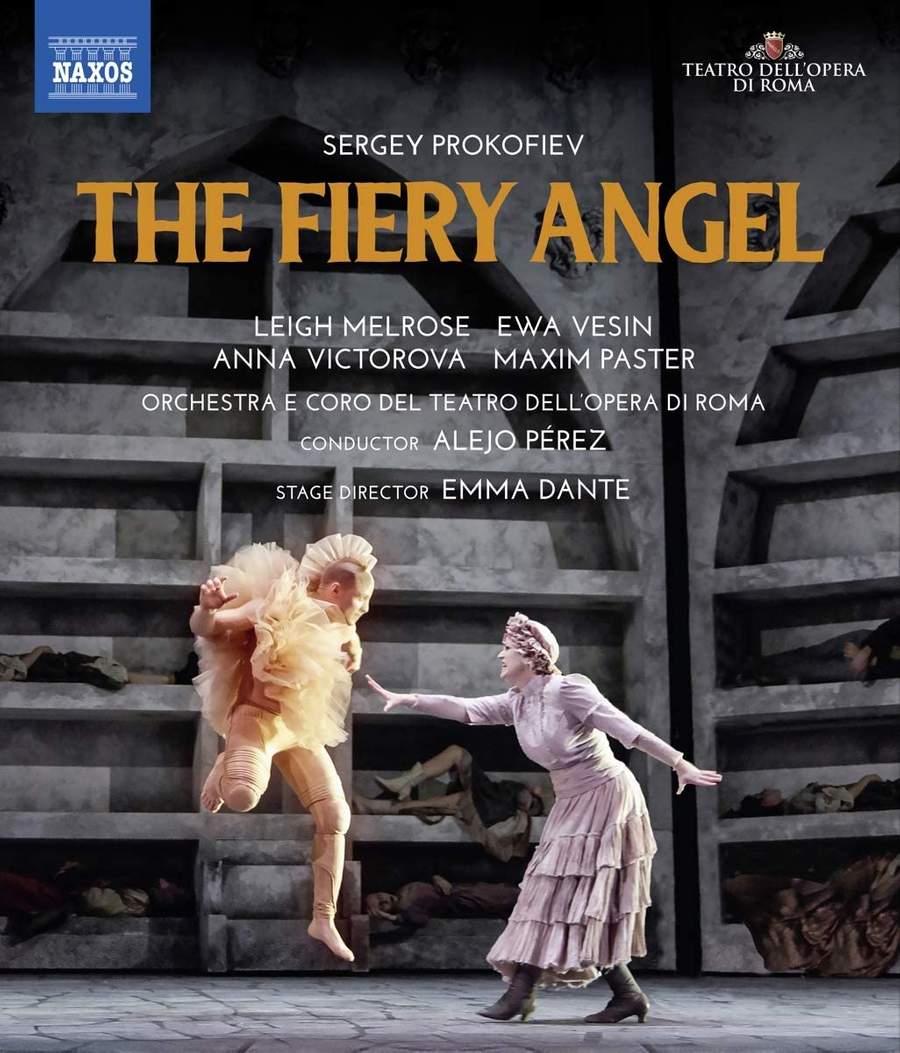PROKOFIEV The Fiery Angel (Perez)
View record and artist detailsRecord and Artist Details
Genre:
Opera
Label: Naxos
Magazine Review Date: 03/2021
Media Format: Digital Versatile Disc
Media Runtime: 133
Catalogue Number: NBD0113V

Tracks:
| Composition | Artist Credit |
|---|---|
| (The) Fiery Angel |
Sergey Prokofiev, Composer
Alejo Pérez, Conductor Andrii Ganchuk, Johann Faust; The Servant, Baritone Anna Victorova, Landlady, Mezzo soprano Coro del Teatro dell'Opera di Roma Domingo Pellicola, Jakob Glock, Tenor Ewa Vesin, Renata, Soprano Goran Juric, Inquisitor, Bass Leigh Melrose, Ruprecht, Baritone Mairam Sokolova, Fortune-teller; Mother Superior, Mezzo soprano Maxim Paster, Mephistopheles, Tenor Orchestra del Teatro dell'Opera di Roma Peter Sokolov, Matthias Wiessman, Baritone Sergey Radchenko, Agrippa of Nettesheim, Tenor |
Author: David Gutman
Prokofiev, who liked to think of himself as an opera composer, had a habit of setting unlikely source material. Never more so than with this vivid take on the Silver Age gothick novella by Valery Bryusov in which that symbolist writer channelled his own romantic history. Prokofiev’s motivation is less obvious. No quasi-supernatural love triangle was likely to appeal to Soviet cultural bureaucrats and the project did not reach the stage in his own lifetime. For decades the music found readier acceptance as rehashed into his Third Symphony. Closer to our own time directors have relished the original’s lurid mix of heartfelt expressionism and camply comic Grand Guignol. Think Roger Corman’s Edgar Allan Poe movies starring Vincent Price. The breakthrough 1991 production by David Freeman, widely seen in Leningrad/St Petersburg, London, Tokyo and the United States, was captured by the BBC and subsequently released on DVD (Arthaus, 10/03). Francesca Zambello’s comparably successful 2004 Bolshoi rethink, memorably conducted by the late Alexander Vedernikov, was not taken up by the record companies. Here though is a lively, modern alternative, preserving RAI’s relay of Emma Dante’s acclaimed Rome Opera production without fancy extras. The show was unveiled as recently as May 2019.
While Prokofiev’s scoring can be thick, shouty enough to drown out protagonists in the theatre, few will complain when Alejo Pérez charges his forces with something like Valery Gergiev’s commitment at the Kirov/Mariinsky. Missing, admittedly, is the tonal specificity and lustre of his orchestra. The sound is immediate, the strings a little thin on top. The language remains Russian but the cast is now international.
Key to the success of any performance of this opera is the portrayal of Renata, the vacillating anti-Lulu whose sexual obsessions power the plot. Here the role is taken by Polish soprano Ewa Vesin, not one whit fazed by her unflattering outfits, let alone Prokofiev’s tortured vocal writing. Relating her first encounters with Madiel, the long-desired fiery angel, she is mousy in rose. Is her tight-fitting matching bonnet a signifier of sexual repression? Galina Gorchakova, in sensational voice for Gergiev, has no such encumbrance. The director says only that she resembles ‘one of the best-known effigies in the Palermo Catacombs – a mummified little girl in a pink dress’. (The Naxos booklet includes an interview and synopsis.)
Carmine Maringola, Emma Dante’s partner, has transplanted the opera from pre-Enlightenment darkness to a literal netherworld with his set design. We are in an underground cemetery of galleries and niches, variably occupied. The look is suitably creepy, albeit Roman rather than Teutonic as specified in the text. Vanessa Sannino’s costumes come from an indeterminate past, not grounded in any particular time or place. The all-pervasive movement, ranging from priestly gesticulation to extracurricular writhing by dancer-demons in body stockings, loincloths or less, owes more to breakdancing and the Freeman precedent than anything in the score. Should you find balletic doppelgängers a distraction in opera this extravaganza won’t be for you.
Outstanding among the singers is Leigh Melrose as Ruprecht, Renata’s would-be rescuer. Having already sung the part in Calixto Bieito’s pitch-black Zurich staging (2017), he gives even the Kirov’s Sergei Leiferkus a run for his money. Incarnated by Andrii Ganchuk and Maxim Paster, Faust and Mephistopheles make a splash, more visual than vocal, in the tavern scene. Prokofiev wanted these Gounod derivatives to enter unobserved. The director disagrees. She later has the pair surveying the grand finale of demonic possession from an elevated perch in the auditorium, risking comparisons with The Muppet Show. Down below, Croatian bass Goran Jurić’s Inquisitor is conventionally robed and impressively sung. It helps that he is tall.
Is there too much focus on the grotesque and the physical? I’d say the music can take it even if the attempt made by Zambello and Bieito to lend dignity, backstory and psychological verisimilitude to the heroine’s plight rather goes by the board. Images are crisp and just occasionally random, an inevitable by-product of the hyperactivity encouraged on stage. This is at the very least a plausible take on one of the weirdest operas in the repertory.
Discover the world's largest classical music catalogue with Presto Music.

Gramophone Digital Club
- Digital Edition
- Digital Archive
- Reviews Database
- Full website access
From £8.75 / month
Subscribe
Gramophone Full Club
- Print Edition
- Digital Edition
- Digital Archive
- Reviews Database
- Full website access
From £11.00 / month
Subscribe
If you are a library, university or other organisation that would be interested in an institutional subscription to Gramophone please click here for further information.




